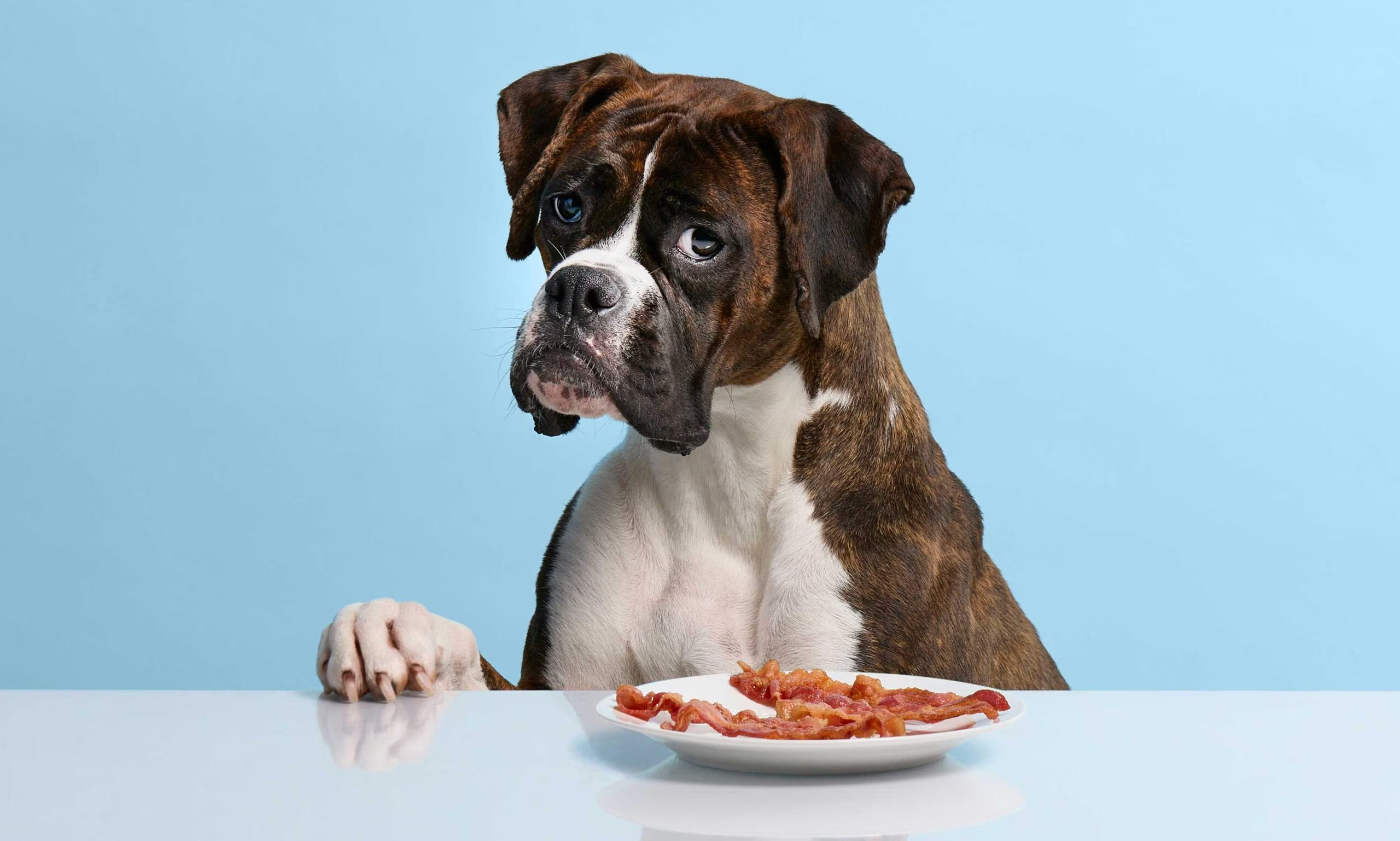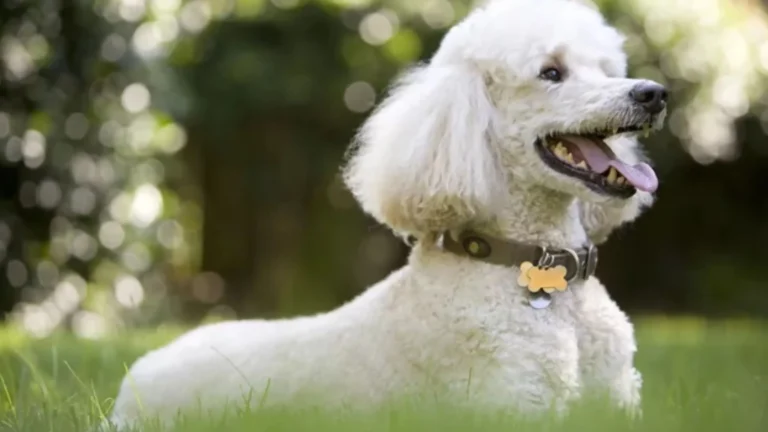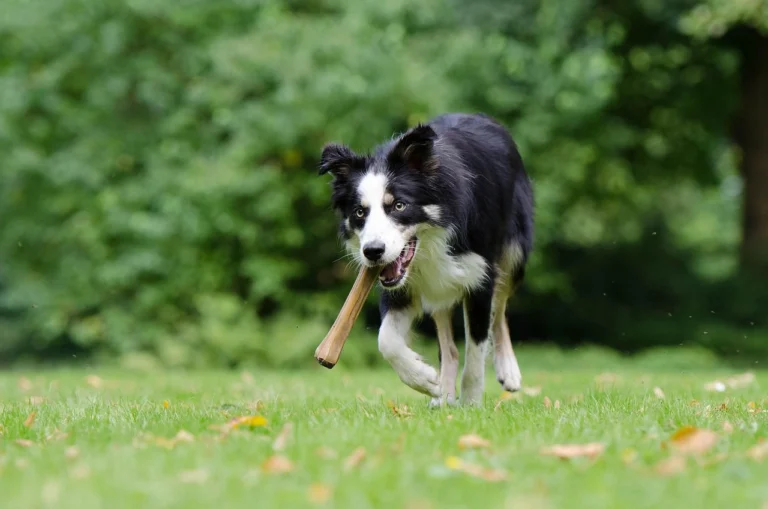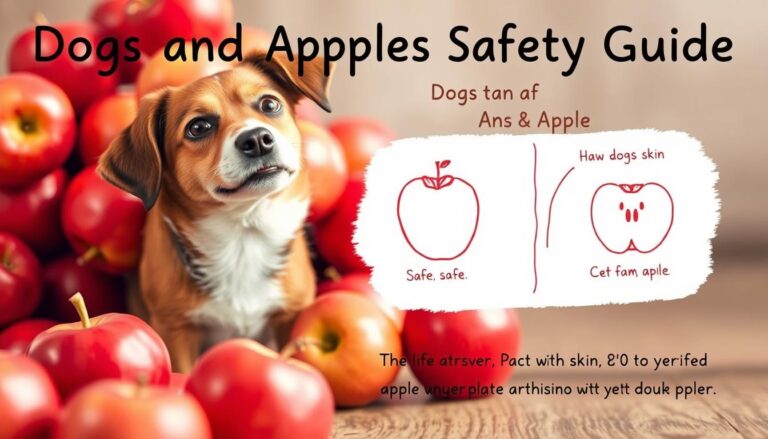Can Dogs have Bacon? Shocking Health Risks Explained Safely!
As a passionate dog owner, I’ve often seen my furry friend’s hopeful eyes when bacon sizzles in the kitchen. The smell is irresistible, making it hard to resist sharing. But, it’s important to know the risks of dogs eating bacon for their health.
Many pet parents ask: can dogs have bacon? The answer is not simple. A small piece might not hurt them right away. But, bacon is not good for dogs because of its high fat and salt. These can cause serious health problems.
Bacon is a favorite among humans, making it tempting to share with our pets. But, it’s key to choose the right food for our dogs. This article will look into the dangers of bacon for pets. It aims to help you make better food choices for your dog.
Knowing the risks of bacon for dogs is more than just a food choice. It’s about keeping your pet healthy and happy for a long time. We’ll see why bacon is bad for dogs and find safer options that keep them happy and healthy.
Table of Contents
Can Dogs Have Bacon? Understanding the Risks of Feeding Dogs
Pet owners need to be very careful about dogs eating bacon. Vets say it’s not good for dogs because of health risks.
Bacon might taste good, but it’s bad for dogs. It’s not safe for them because of the fat and salt. These can cause health problems.
Why Bacon Poses Serious Health Threats
Dogs can get sick from bacon. The dangers include:
- Too much sodium
- Pancreas inflammation
- Fast weight gain
- Stomach problems
Comprehensive Health Concerns
Eating bacon often can make dogs very sick. It has:
- Too much saturated fat
- Bad preservatives
- High salt
- Other harmful additives
Digestive System Impact
Dogs can’t digest bacon well. Eating it can cause stomach upset. This includes vomiting, diarrhea, and long-term health issues.
Vets always advise against giving bacon to dogs because of the health risks.
The Hidden Dangers of Bacon’s High Fat Content
Bacon might seem tasty, but it’s risky for dogs. The high fat in bacon can cause serious health problems. It’s important for pet owners to know the dangers of bacon for dogs.
Fat-rich foods like bacon can upset a dog’s stomach. This can lead to many health issues. The high fat content is a big concern for your pet’s health.
Risk of Pancreatitis in Dogs
Pancreatitis is a serious problem from eating bacon. It happens when the pancreas gets inflamed, often from eating too much fat. Symptoms include:
- Severe abdominal pain
- Persistent vomiting
- Loss of appetite
- Dehydration
- Fever
Long-term Effects on Dog’s Weight
Eating bacon regularly can make dogs obese. The extra calories and fat lead to weight gain. This can cause more health problems.
| Weight Impact | Potential Health Risks |
|---|---|
| 10% Weight Gain | Reduced mobility |
| 20% Weight Gain | Joint stress |
| 30% Weight Gain | Diabetes risk |
Signs of Fat-Related Health Issues
Look out for these signs of health problems from too much fat:
- Decreased energy levels
- Difficulty breathing
- Reluctance to exercise
- Visible fat deposits
Keeping your dog healthy means watching what they eat. High-fat foods like bacon can be harmful.
Sodium Content and Its Effects on Dogs
When thinking about can dog have bacon, it’s key to know the sodium risks. Bacon has a lot of salt, which is bad for dogs.
Dogs can’t handle sodium like humans do. Even a little bacon can cause sodium poisoning. This can lead to serious health problems.
- High sodium levels can cause rapid dehydration
- Increased thirst becomes an immediate response
- Potential for sodium ion poisoning exists
Sodium toxicity in dogs shows serious symptoms that need quick action:
| Symptom | Potential Severity |
|---|---|
| Vomiting | Moderate to Severe |
| Diarrhea | Moderate |
| Muscle Tremors | Severe |
| Seizures | Critical |
Dogs can’t handle too much salt like humans do. Even a few strips of bacon can be too much. It can cause serious health issues.
Veterinary experts consistently warn against feeding bacon to dogs due to its extreme sodium content.
Keeping your dog healthy means watching what they eat. Bacon is one of those foods that seems harmless but is actually dangerous.
Can Dog Have Bacon: Expert Veterinary Insights
Veterinary experts have strong opinions about dogs eating bacon. While a tiny bit might not hurt, they warn against regular bacon for dogs. It’s important to know the risks and follow their advice for your pet’s health.
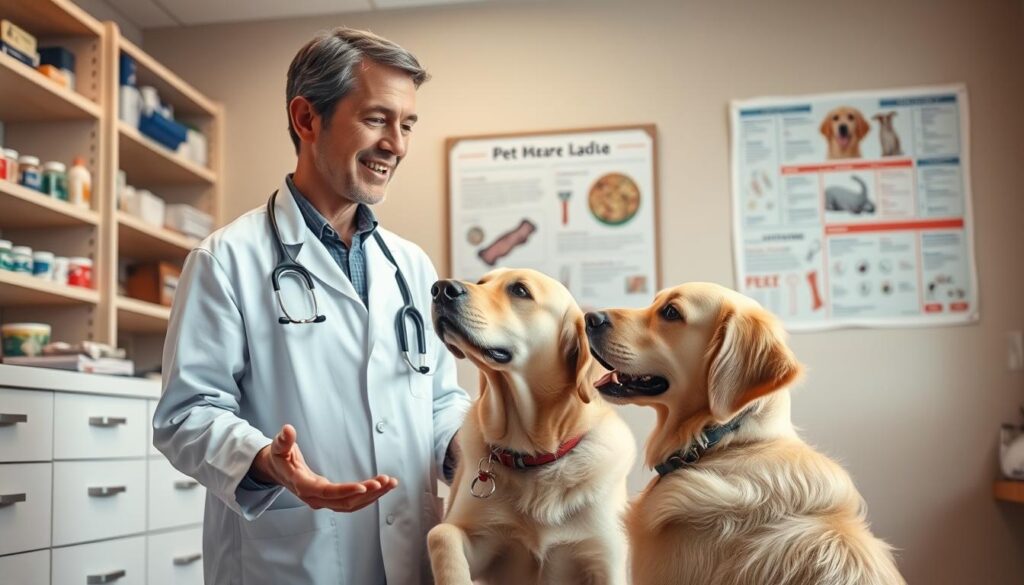
Experts say bacon is not safe for dogs. The fat and salt in bacon can cause serious health problems for dogs.
Professional Recommendations
Vets usually advise against bacon for dogs. They recommend:
- Don’t give bacon to your dog
- Don’t use bacon as a treat
- Choose safer, leaner proteins for your dog
Safe Portion Guidelines
If your dog eats bacon by mistake, here’s what to do:
| Dog Size | Recommended Action | Monitoring Period |
|---|---|---|
| Small Dogs | Watch for digestive issues | 24-48 hours |
| Medium Dogs | Monitor hydration and energy levels | 48-72 hours |
| Large Dogs | Check for signs of pancreatitis | 72-96 hours |
When to Consult Your Vet
See a vet right away if you notice these symptoms after your dog eats bacon:
- Persistent vomiting
- Diarrhea lasting more than 12 hours
- Significant changes in appetite
- Lethargy or weakness
“Prevention is always better than cure when it comes to your dog’s diet.” – Veterinary Nutrition Expert
Remember, your dog’s health is most important. Bacon might taste good, but it’s safer to stick with dog food and vet-approved treats.
Raw vs. Cooked Bacon: Which is Worse for Dogs?
Pet owners need to know the big difference between raw and cooked bacon for dogs. Your dog’s health depends on the food choices you make.
Raw bacon is much riskier for your pet. The dangers include:
- Parasitic infections
- Bacterial contamination like salmonella
- Higher risk of foodborne illnesses
Cooked bacon might seem safer, but it’s still risky. The dog bacon diet should exclude bacon altogether. Cooking bacon kills some bacteria, but the fat and sodium are still bad for dogs.
“No form of bacon should be considered safe for regular canine consumption” – Veterinary Nutrition Experts
Cooking bacon doesn’t make it healthy for dogs. The cooking method doesn’t fix the nutritional problems. Both raw and cooked bacon can cause serious health issues like pancreatitis, obesity, and digestive problems.
The best thing to do is avoid giving bacon to your dog, whether it’s raw or cooked. Choose vet-approved treats that meet your dog’s nutritional needs without risks.
Signs Your Dog Has Eaten Too Much Bacon
Bacon is not good for dogs. If your dog eats too much bacon, you’ll see warning signs. These signs are important to watch for to keep your dog safe.
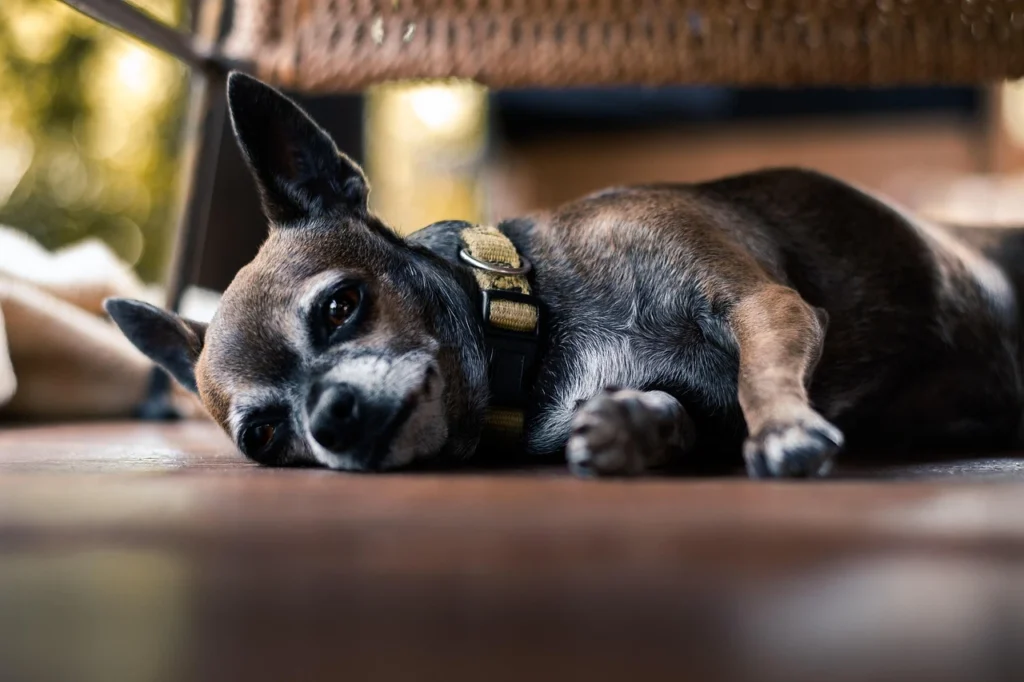
Feeding dogs bacon can cause serious problems. It’s key to spot these signs early to help your pet.
Common Symptoms to Watch For
- Persistent vomiting
- Frequent, watery diarrhea
- Sudden lethargy or decreased energy
- Unusual thirst or increased water consumption
- Abdominal pain or visible discomfort
Emergency Warning Signs
Some symptoms mean your dog needs vet help right away:
- Severe, repeated vomiting
- Blood in stool or vomit
- Extreme weakness or collapse
- Signs of potential pancreatitis
- Rapid, shallow breathing
When to Seek Immediate Care
If your dog shows these serious signs after eating bacon, call your vet fast:
- Continuous vomiting for more than 24 hours
- Visible signs of extreme pain
- Persistent diarrhea lasting over 48 hours
- Any indication of neurological changes
- Signs of dehydration
Remember, bacon is bad for dogs. Spotting and acting on these symptoms quickly can save your dog’s life.
Healthy Alternatives to Bacon for Dogs
Finding safe bacon treats for dogs doesn’t mean giving up on taste. Pet owners can find many healthy options that their dogs will love. These options keep their pets healthy and happy.
Lean meats are great alternatives to bacon. Chicken and turkey are full of protein but low in fat. They’re easy to cook:
- Boiled skinless chicken breast
- Lean turkey strips
- Baked white fish
Commercial dog treats have made healthy snacking easier. Many brands offer bacon-flavored treats that taste like bacon but are better for dogs.
Here are some protein-rich options to replace bacon treats:
- Freeze-dried meat chunks
- Low-sodium jerky for dogs
- Dehydrated meat strips
Remember, moderation is key. Choose high-quality, vet-approved treats. Your dog’s diet should focus on balanced nutrition, not just tasty treats.
Always consult your veterinarian before making big changes to your dog’s diet.
Turkey Bacon and Other Alternatives: Are They Better?
Dog owners often look for safer bacon options for their pets. They avoid traditional pork bacon and seek out alternatives. These alternatives might seem safer, but are they really better?
Is bacon safe for dogs? The answer is no, even with alternatives like turkey bacon. These options still risk your dog’s health.
Comparing Bacon Alternatives
Not all bacon alternatives are the same. Let’s look at the most common ones:
- Turkey Bacon: Slightly leaner but still high in sodium and additives
- Plant-Based Bacon: Often contains seasonings harmful to dogs
- Chicken Bacon: Still too fatty and processed for regular consumption
Safer Meat Options for Dogs
Instead of bacon, try these healthier options:
| Meat Option | Safety Level | Recommended Preparation |
|---|---|---|
| Lean Chicken | Very Safe | Unseasoned, boiled or grilled |
| Turkey | Safe | Plain, no skin or bones |
| Lean Beef | Moderate | Cooked thoroughly, no added seasonings |
Vets always advise against processed meats like bacon for pets. Moderation and plain, lean proteins are key to maintaining your dog’s health. Always talk to your vet before adding new foods to your dog’s diet.
Conclusion
When thinking about whether dogs can have bacon, the answer is clear. Bacon is not good for dogs because it’s too fatty. It can harm their health in the long run. Vets always say no to bacon for dogs.
Your dog’s diet is key to their health. Those cute puppy eyes might make you want to give them bacon. But, bacon can cause pancreatitis, too much sodium, and weight problems.
Instead of bacon, try safe treats made for dogs. These treats are tasty and good for your dog’s diet. They keep your dog healthy and happy without the risks of bacon.
So, always be careful about giving bacon to dogs. Talk to your vet about the best treats for your dog. Choose treats that make your dog’s health better, not worse.

